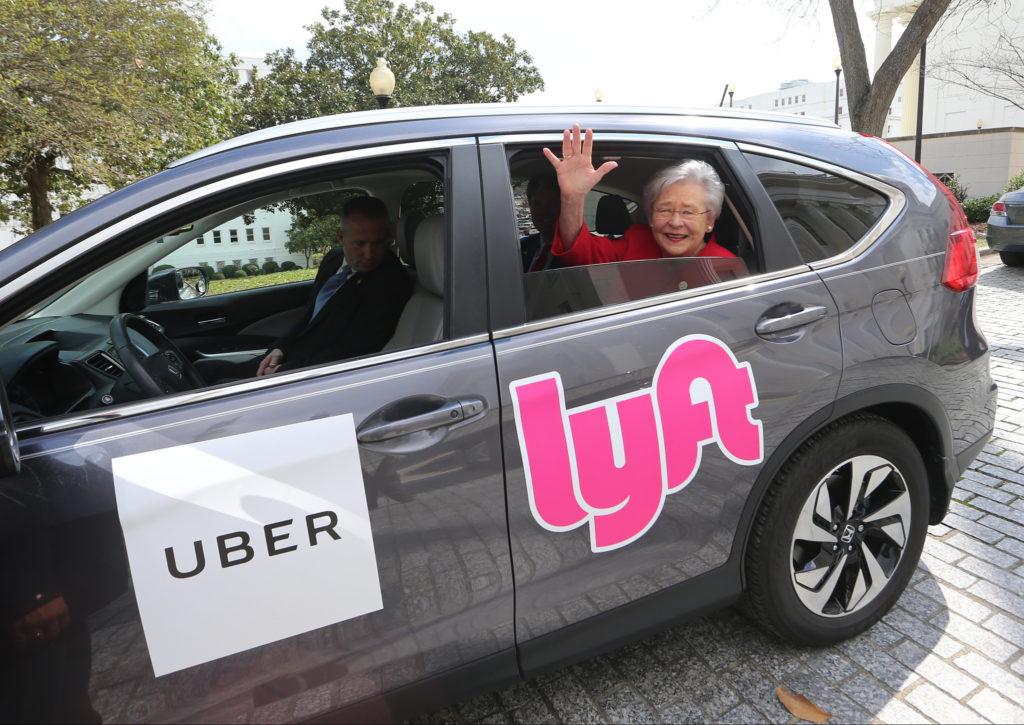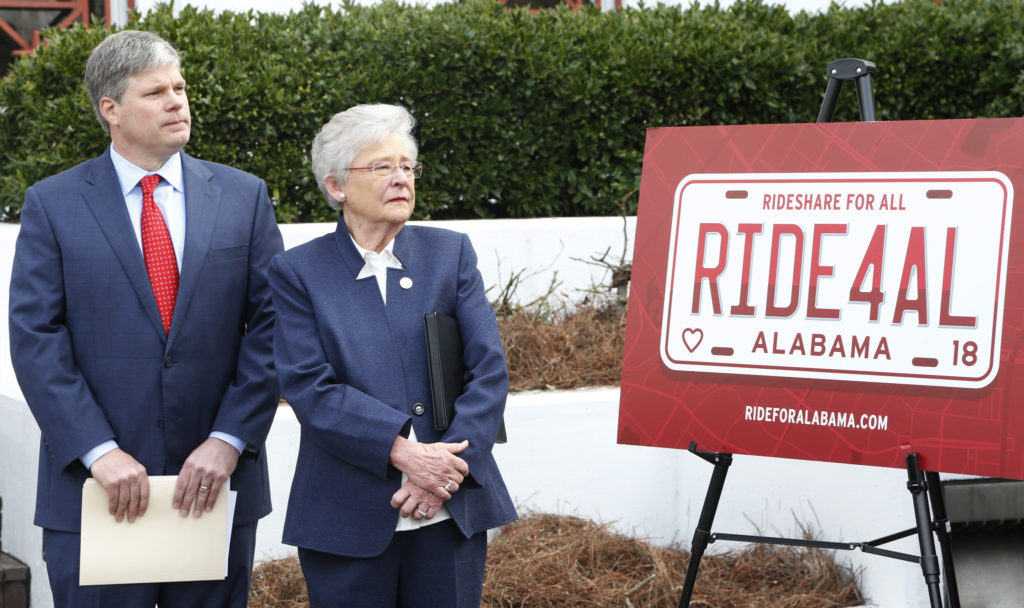Kay Ivey signs ridesharing bill allowing Uber, Lyft statewide

Governor Kay Ivey on Thursday — alongside Mountain Brook-Republican State Rep. David Faulkner and Greensboro-Democrat state Senator Bobby Singleton, Ride for Alabama coalition members and local rideshare drivers — signed Alabama’s rideshare legislation into law during a bill signing ceremony at the State Capitol. Alabama is the 45th state in the nation to welcome comprehensive ridesharing, allowing companies like Lyft and Uber to operate statewide. “Today, we are paving the way for ridesharing throughout all of Alabama, regardless of location or proximity to major metropolitan areas,” Ivey said. “I am proud to have supported this bill throughout the legislative process and commend the hard work of Representative Faulkner and Senator Singleton for sponsoring the bill and Ride for Alabama coalition members for their strong support throughout the legislative process.” “When I first spoke at the Ride For Alabama coalition launch in January, I stated that one of my primary responsibilities in the Alabama House is to ensure that all Alabama residents have access to safe, reliable and efficient methods of transportation,” added Faulkner. “The legislation that I and Senator Singleton carried, and that Governor Ivey signed today, does just that.” Previously, ridesharing companies were allowed to operate only in select, approved cities in Alabama. By enacting statewide legislation, suburban and rural communities will now have access to the many benefits the rideshare industry provides, including enhanced driver earning opportunities. “Rural parts of our state will now have access to these innovative transportation methods, and more Alabama residents will have the opportunity to earn additional income,” said Singleton. “With Governor Ivey giving her signature to this legislation, Alabama’s economy will move forward, public safety will increase and Alabama residents will experience greater quality of life.” Uber and Lyft both thanked Ivey for her support of the legislation. “We want to thank the Governor for her support of this law. Lyft is providing tens of thousands of Alabamians earning opportunities and transportation options that did not exist a few short years ago,” said Scott Coriell, communications manager for Lyft. “We’re excited to expand those benefits to more individuals and families around the state in the coming months.” “With this statewide framework for ridesharing, more Alabamians will benefit from access to safe rides and flexible work opportunities through Uber – and current customers will benefit from an even more reliable experience,” said Uber General Manager, Kasra Moshkani. “We thank Governor Ivey, Representative Faulkner, and Senator Singleton for their leadership and look forward to expanding throughout Alabama.” Throughout the legislative process, the bill was supported publicly by the Ride for Alabama coalition, comprised of multiple Chambers of Commerce and third-party entities, such as the Alabama Hospitality and Restaurant Association, Birmingham Urban League, Decatur-Morgan County Chamber of Commerce, the National Association of Women Law Enforcement Executives, the Alabama Black Chamber of Commerce, and the Alabama Association for the Deaf, among others. The law will take effect July 1.
Ridesharing bill on the move in the state Senate

Ridesharing services like Lyft and Uber took a step toward to becoming legal in Alabama, as the Senate Tourism and Marketing Committee approved a bill on Thursday that will now head to the full Senate for further consideration. The would create a ridesharing network across the state for companies and place it under the control of the Alabama Public Service Commission (PSC). A single permit issued by the PSC would then allow the companies to operate statewide under uniform regulations rather than requiring each municipality to file for their own permits and regulations. Alabama is one of only six states that lacks statewide ridesharing regulations. If passed, the bill would allow Alabamians from not only the larger cities, but also suburban and rural communities across the state to take advantage of all benefits the ridesharing industry produces. Currently, ridesharing companies like Uber and Lyft operate in only 15 of the larger cities across the state —Auburn, Birmingham, Daphne, Gardendale, Gulf Shores, Homewood, Hoover, Huntsville, Mobile, Montgomery, Mountain Brook, Pelham, Tuscaloosa, Trussville and Vestavia Hills — but due to a lack of comprehensive, statewide regulations aren’t able to operate in all parts of the state. On Jan. 11, Mountain Brook-Republican State Rep. David Faulkner introduced the House companion bill, HB 190.
Support grows for bipartisan, statewide ridesharing bill

Want to take an Uber in Alabama? Well you can, depending on where you live. Currently, ridesharing companies like Uber and Lyft operate in only 15 of the larger cities across the state —Auburn, Birmingham, Daphne, Gardendale, Gulf Shores, Homewood, Hoover, Huntsville, Mobile, Montgomery, Mountain Brook, Pelham, Tuscaloosa, Trussville and Vestavia Hills — but due to a lack of comprehensive, statewide regulations aren’t able to operate in all parts of the state. Which is what Mountain Brook-Republican State Rep. David Faulkner and Greensboro-Democratic State Sen. Bobby Singleton hope to remedy this legislative session. They’re soon introducing a bill that would create a ridesharing network across the state for companies like Uber and Lyft, and place it under the control of the Alabama Public Service Commission. On Thursday, the pair was joined by Gov. Kay Ivey on the steps of the State House where they discussed plans for the bipartisan, statewide ridesharing legislation. They were also joined by the “Ride for Alabama” coalition, formed by supporters of the bill. More than 30 local rideshare drivers were also in attendance. “To embrace the future, Alabama must accommodate modern transportation demands. The ability to request an on-demand ride is no longer considered a perk of being in a big city, it is an expectation no matter where one lives or work,” Ivey at the press conference. “Having consistent rules statewide for ridesharing is the sensible way to give Alabamians access to safe, consistent and efficient transportation options.” Alabama is one of only six states that lacks statewide ridesharing regulations. If passed, the bill would allow Alabamians from not only the larger cities, but also suburban and rural communities across the state to take advantage of all benefits the ridesharing industry produces. “Alabama has the opportunity to make the best decision for the state’s future with regard to a statewide ridesharing framework, as the passage of this bill would provide citizens from one corner to the other with the opportunity for safe and reliable transportation,” said Faulkner. “Ridesharing creates transportation options for those with low incomes, the elderly, and people with disabilities,” added Singleton. “By increasing overall transportation access for all of Alabama, we are also creating new economic opportunities for our state.” Ride for Alabama is made up of multiple Chambers of Commerce and third-party entities, such as Birmingham Urban League, Decatur-Morgan County Chamber of Commerce, the National Association of Women Law Enforcement Executives, the Alabama Black Chamber of Commerce, Young Alabama and the Alabama Association for the Deaf, Inc., among others. “Embracing innovative and forward-thinking technology platforms like Lyft and Uber will continue to move Alabama forward,” said Deon Gordon, Ride for Alabama coalition member and president, TechBirmingham. “The time has come for Alabama to become the 45th state to expand these vital transportation options to all.”
Bill to regulate payday lenders inches closer to final passage

As the clock winds down on the Alabama Legislature’s 2016 Regular Session, a bill to regulate payday lenders which started with a great deal of momentum is now inching itself toward the finish line, despite broad support from both sides of the aisle in Montgomery. SB91, sponsored in the Alabama Senate by powerful senator and committee chairman Arthur Orr (R-Decatur), and carried in the House by Sophomore member David Faulkner (R-Mountain Brook) would cap maximum annual interest on payday loans at 180 percent, down from current interest rates of 456 percent per year. The bill passed the Alabama Senate nearly unanimously, garnering merely a single No vote. While supporters of the bill believe they have the votes in the House, the bill is meeting some resistance on its way to final passage. At a roundtable discussion held on April 18th by the Junior League of Birmingham, Rep. Faulkner said his primary goal is to get the bill, which he admits isn’t perfect but is a step in the right direction, out of committee and out of the House without any changes. The bill did not receive a vote after a lengthy public hearing during last week’s Financial Services Committee meeting, during which members heard from advocates on both sides of the issue. The reform being championed by two Republicans is somewhat of an anomaly, as such changes have frequently been carried by Democrats in other states. But Faulkner told Alabama Today it was a no brainer for him as soon as the lenders’ tactics were explained to him. “When the issue was explained to me by a member of my church I just knew it was the right thing to do,” said Faulkner. “I see these places all over the place, I’ve heard the stories, once I learned more about it, I felt like this was usury, and that the State of Alabama is wrong for having a system in place that really allowed people to be preyed upon. I’m a less government, small government conservative, but I don’t believe when the government put in place a system that allows people to be preyed upon, I felt like that was wrong.” A database created by the Alabama Department of Banking found Alabamians took out 462,209 loans over a 10-week period. A total of $146 million was borrowed, or an average of about $14 million each week. A coalition of activists from across the state have fought for years to bring this reform to the table. The Alliance for Responsible Lending in Alabama (ARLA) has members from the Arise Citizens’ Policy Project, Alabama Appleseed, the Alabama State Conference of the NAACP, the Alabama Citizens’ Action Program, the Southern Poverty Law Center, and the Federation of Republican Women. The group argues it has the deck stacked against them, with a well-funded special interest bolstering the bill’s opposition. A report by AL.com’s Kyle Whitmire found during the 2014 election cycle lenders gave more than $475,000, including $37.835 to House Speaker Mike Hubbard (R-Auburn) and thousands more to other influential members of the House and Senate. While opponents of reform say such loans are sometimes necessary to help low-income families through tough times, ARLA policy analyst Stephen Stetson wrote in an op-ed last month that what can appear to be a helping hand for those in need can be an “anchor” holding them in a cycle of poverty. “We all want a world where people can get the kinds of credit they need. But that requires putting some brakes on a system that all too often acts as an engine for poverty, handing out extremely high-cost loans to desperate folks who may treat them as a lifeline. Too often, those ‘lifelines’ instead end up as anchors, dragging people into financial quicksand.” With only two weeks left in the session, the bill’s advocates have precious few days to shepherd it through the rest of the legislative process and onto the governor’s desk.
Alabama legislative preview: April 4 – April 8, 2016

Legislators return to Montgomery this week after their spring break, with the House of Representatives convening at 1 p.m. and the Senate an hour later Tuesday. In the Senate, lawmakers are slated to take up SB342 from Sen. Vivian Figures (D-Mobile), which would make the transmission of an explicit message a Class A misdemeanor. The body will also take up SB347 from Sen. Paul Bussman (R-Cullman), which would legalize the manufacturing of industrial hemp in the state. The Senate will also take up SB14 from Sen. Gerald Allen (R-Tuscaloosa), which would allow citizens to carry a pistol in a vehicle without a permit. Over in the House, lawmakers will take up two alcohol-related bills: HB46 from Rep. Alan Boothe (R-Troy) would allow Alabama distilleries to sell their product for off-premise consumption and HB83 from Rep. David Faulkner (R-Birmingham) would allow state wineries to establish an off-site tasting room. On Wednesday, committee hearings will get underway. At 1 p.m. in room 325 of the state house, the Senate Judiciary Committee will take up the grandparent’s visitation rights bill, HB334 from Rep. Mike Jones (R-Andalusia), as well as HB115 from Rep. Paul Sanford (R-Huntsville), which would decriminalize possession of the marijuana-based, seizure-reducing medication CBD oil. At 1:30 p.m in room 727 at the state house, the Senate Rules Committee will take up SB97 from Sen Gerald Dial (R-Lineville), which would allow the Ten Commandments to be displayed on state property and at public schools. At 9 a.m. in room 429 of the state house, the House Health Committee will take up HB183 from Rep. Kerry Rich (R-Guntersville), which would require abortion providers to conduct a sonogram before providing an abortion. At 1:30 p.m. in room 418 of the state house, the House Committee on Education Policy will take up HB299 from Rep. Ed Henry (R-Decatur), which would prohibit local school boards from adopting or enforcing “zero tolerance” policies regarding drugs, alcohol, weapons or physical harm to another person. The bill would also require that the definition of firearm be “narrowly construed.”
Mobile delegation opposes amendment to allow vote on minimum wage hike

The House Committee on Mobile County Legislation met Wednesday to discuss a slew of local legislation, including HB248 from Rep. Napoleon Bracy (D-Mobile). The constitutional amendment would allow Mobile citizens to vote on whether or not to raise the county’s minimum wage to $10.10 an hour. Bracy brought forth the bill in the form of a constitutional amendment in order to skirt around legislation passed earlier this session. HB174 from Rep. David Faulkner (R-Birmingham), also known as the Alabama Uniform Minimum Wage and Right to Work Act, was filed to thwart efforts by the Birmingham city council to gradually raise that city’s minimum wage to $10.10 an hour over three years. After being signed into law by Gov. Robert Bentley, the bill effectively bars in Alabama city or county from raising its minimum wage. If passed, the amendment would have been voted on by Mobile County voters in the upcoming November election. At the time of the committee’s vote Wednesday, eight committee members were present. The four representatives who voted against the bill, causing voting to end in a tie and causing the bill to gain an unfavorable report, were Reps. David Sessions (R-Mobile), Victor Gaston (R-Mobile), Margie Wilcox (R-Mobile) and Jack Williams (R-Mobile). The four Democrats on the committee voted in favor of the measure. Because of its failure to garner a favorable report in the committee hearing, the bill will not be heard by the full House of Representatives.
House Judiciary panel blocks LGBT civil rights bill

On Wednesday, members of the public were prepared to weigh in on Rep. Chris England’s proposal to expand civil rights protections to include more members of the LGBT community. However, at the last minute, House Judiciary Committee Chairman Mike Jones announced that the public hearing had been cancelled. The committee voted instead to carry House Bill 615 over for further discussion. HB 615 would establish civil rights protections against any discrimination based on sexual orientation, gender identity, or familiar status. England said that each characteristic identified in the bill – race, class, and religion, for example – had been because the group had suffered some form of discrimination. England told lawmakers, “There has been some history that if it isn’t enumerated, it isn’t protected.” Rep. Merika Coleman-Evans offered her support of the bill, saying, “It would be nice for Alabama to be at the beginning of the trend and not always at the tail end.” However, other lawmakers expressed concerns over whether the language in HB 615 could be challenged in the courts. “I would like to table this until we’ve had more time for discussion,” Rep. David Faulkner said. “This bill came very late and it raises some very big issues.” England’s bill is one of two civil rights bills that committee members discussed this week. On Tuesday, the panel gave a favorable report to House Bill 657, companion legislation to a proposal filed last week by Sen. Del Marsh to ban discrimination against state employees on the basis of “immutable” characteristics unrelated to a person’s job performance.

